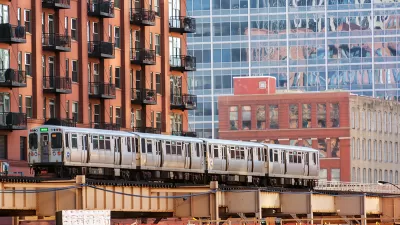The new funding criteria established for the expansion of the U.S. Department of Transportation's popular TIFIA loan program may make it easier for projects such as the infamous "bridge to nowhere" to secure financing.
The Fiscal Times' Josh Boak reports on the new rules established by the federal transportation bill for the rapidly expanding, and increasingly important, TIFIA (Transportation Infrastructure Finance and Innovation Act) credit loan program. "A project's potential economic benefits are no longer among the standards for awarding loans and loan guarantees, which will now be decided primarily by creditworthiness. And applicants must now be considered on a first-come, first-served basis, instead of competing against each other for a pool of money that Congress has increased tenfold to $1.7 billion for the next two years."
Some worry the change ceded too much of the Administration's control over the program in granting projects with a better ability to pay back loans first dibs at TIFIA financing. This will allow projects like self-financing toll roads to take preference over mass-transit, changing the way the federal government prioritizes transportation projects.
"Critics note that the government might no longer be able to get the biggest bang for its buck," reports Boak. "Federal officials would disburse loans to state and regional authorities that got their applications to the government the fastest, rather than to programs that could do more to fuel economic growth." Still, supporters of the changes hope they will help to jumpstart financing for construction and make the program more responsive to applicants.
FULL STORY: New Law Puts "Bridge to Nowhere" Back on Track

Alabama: Trump Terminates Settlements for Black Communities Harmed By Raw Sewage
Trump deemed the landmark civil rights agreement “illegal DEI and environmental justice policy.”

Study: Maui’s Plan to Convert Vacation Rentals to Long-Term Housing Could Cause Nearly $1 Billion Economic Loss
The plan would reduce visitor accommodation by 25% resulting in 1,900 jobs lost.

Planetizen Federal Action Tracker
A weekly monitor of how Trump’s orders and actions are impacting planners and planning in America.

Wind Energy on the Rise Despite Federal Policy Reversal
The Trump administration is revoking federal support for renewable energy, but demand for new projects continues unabated.

Passengers Flock to Caltrain After Electrification
The new electric trains are running faster and more reliably, leading to strong ridership growth on the Bay Area rail system.

Texas Churches Rally Behind ‘Yes in God’s Back Yard’ Legislation
Religious leaders want the state to reduce zoning regulations to streamline leasing church-owned land to housing developers.
Urban Design for Planners 1: Software Tools
This six-course series explores essential urban design concepts using open source software and equips planners with the tools they need to participate fully in the urban design process.
Planning for Universal Design
Learn the tools for implementing Universal Design in planning regulations.
Caltrans
Smith Gee Studio
Institute for Housing and Urban Development Studies (IHS)
City of Grandview
Harvard GSD Executive Education
Toledo-Lucas County Plan Commissions
Salt Lake City
NYU Wagner Graduate School of Public Service




























